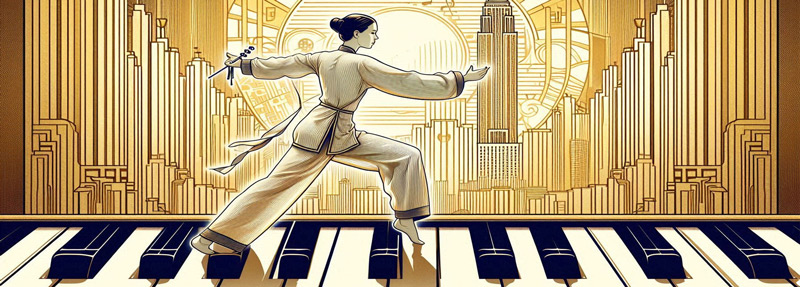Tai Chi Lessons from a Broken Piano: Work with What You Have

How often do we see videos of Champion Tai Chi Performers or “Masters” and say, “If only I could do that but I’m… too {uncoordinated} {big} {short} {old} {insert another issue here}, have {arthritis} {bad knees} {a neurological condition} {insert another issue here}, don’t have {flexibility} {balance} {strength} {insert another issue here}.” If you think that way, then you are very wrong. Real Tai Chi isn’t about having the highest kick, the lowest stance or the greatest endurance. It’s about using your mind to focus on who YOU are and what YOU can do, making the most of the body you’ve been given. Accept that and your Tai Chi will flourish.
A pianist by the name of Keith Jarrett, arrived at a concert exhausted and hungry but felt he could still perform until he sat down at a piano that was broken and completely unplayable. He realised at that moment the unplayable piano was all he had to work with, so he improvised the entire concert working around the limitations of that piano. The Köln concert, would go on to be the best-selling solo jazz album and best-selling piano album of any genre - https://www.youtube.com/watch?v=wIXMkZAcgRo
Similarly, our Tai Chi history is littered with remarkable people who worked with the bodies they had and left legacies of breathtaking Tai Chi. Yang Cheng Fu, the grandson of Yang Style Founder Yang Lu Chan, gained a lot of weight in his later years (purportedly weighing in at 160kg toward the end of his life), yet he was a highly regarded practitioner right until the end. What did he do with his Tai Chi form… modified it! Sun Lu Tang, the founder of Sun Style Tai Chi was apparently born slightly bow-legged yet made Tai Chi his own. Doreen Hynd, a well-known disciple of Sophia Delza, was still teaching Tai Chi at 93 years old and was incredible.
What all of these people had in common was their understanding of the Tai Chi principles and foundational skills. Just like pianist Keith Jarrett, playing a broken piano, he understood music theory and worked with the instrument he had, and so did they.
So, focus on your internal skills, study the principles of Tai Chi and use that knowledge to create your own music on whatever body instrument you’ve been given to play. With focus and determination, you too may be someone others look at in rapt admiration.
“Constraints are liberating because they direct creativity in the directions that matter, so we can be creative in other ways.”
- Herb Sutter
Recent Posts
- The Year of the Fire Horse – Ride it without Fear
- Caring for the Self
- Eight Energies, Five Steps, Two Weeks, and a Lifetime of Practice: Training at Beijing Sports University 2025
- Qigong: A Guide to Understanding the Many Paths of Energy Cultivation
- The Year of the Wood Snake and Tai Chi/Qigong: A Harmonious Interplay
- An Introduction to the Six Harmonies in Taijiquan
- Tai Chi Lessons from a Broken Piano: Work with What You Have
- Tai Chi and Cage Fighting: Zhang WeiLi, China’s UFC Champion
- Studio 14 - The Launch of a Dream
- It’s The Year of the Wood Dragon – A Great Time to Dream Big
Tags
Archive
- January 2026 (1)
- December 2025 (1)
- November 2025 (1)
- March 2025 (1)
- January 2025 (1)
- November 2024 (1)
- September 2024 (1)
- July 2024 (1)
- January 2024 (2)
- December 2023 (1)
- September 2023 (1)
- June 2023 (2)
- April 2023 (1)
- January 2023 (2)
- November 2022 (1)
- August 2022 (1)
- March 2022 (1)
- January 2022 (2)
- September 2021 (1)
- May 2021 (1)
- March 2021 (1)
- February 2021 (2)
- January 2021 (1)
- December 2020 (1)
- August 2020 (1)
- April 2020 (1)
- January 2020 (1)
- October 2019 (1)
- May 2019 (2)
- April 2019 (1)
- March 2019 (3)
- February 2019 (2)
- January 2019 (3)
- December 2018 (2)
- October 2018 (1)
- July 2018 (1)
- June 2018 (1)
- April 2018 (2)
- February 2018 (1)
- October 2017 (1)
- September 2017 (1)
- April 2017 (2)
- March 2017 (1)
- January 2017 (2)
- December 2016 (2)
- October 2016 (1)
- September 2016 (1)
- August 2016 (1)
- July 2016 (2)
- June 2016 (21)
